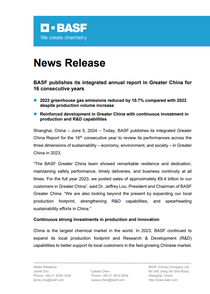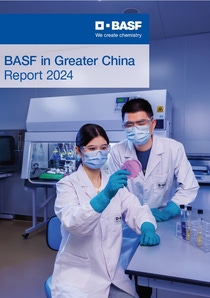BASF publishes its integrated annual report in Greater China for the 17th consecutive year
- Strengthened the presence in Greater China through continued investment in production and R&D
- Made stready progress toward the goal of net-zero carbon emissions by 2050
Shanghai, China – June 18, 2025 – Today, BASF publishes its integrated Greater China Report for the 17th consecutive year. The report reviews performance across the three dimensions of sustainability — economy, environment, and society — in Greater China for the year 2024. This marks the first occasion that BASF Greater China has disclosed comprehensive information since the launch of BASF’s “Winning Ways” strategy in 2024.
“Our net sales in Greater China declined slightly to €8.6 billion in 2024. However, the sales volume witnessed a 2% year-over-year growth, demonstrating our resilience and steady recovery amid industry challenges,” said Dr. Jeffrey Lou, President and Chairman of BASF Greater China. “Despite the headwinds, we remain committed to our purpose — we create chemistry for a sustainable future – and will navigate forward with the mindset of transformation.”
Focus on high-growth market and accelerate innovation
China remains a key driver of global growth in the chemical industry. In 2024, BASF further strengthened its presence in Greater China by focusing on high-growth market, accelerating innovation, and enhancing its competitive edge.
The BASF Zhanjiang Verbund site project, with a total investment of around €10 billion, is progressing steadily as scheduled. In 2024, BASF broke ground on a methyl glycols plant at the Zhanjiang Verbund site.
BASF also expanded its advanced additives plant in Nanjing, scheduled for completion by the end of 2025. A second polymer dispersions line at the BASF Daya Bay site was inaugurated in 2024 to improve its supply chain agility for industries including coatings, construction, and packaging.
To further advance R&D capabilities, BASF inaugurated the Verbund Technology Center (VTC) at the Zhanjiang Verbund site, and the new Asia Pacific Application and Technical Center of Coatings division in 2024. BASF was also honored as one of the “Blue Whale 50 – Top 50 Global Large Enterprises in Open Innovation”, recognizing its achievements in scientific and technological innovation.
Low-carbon production and sustainable innovation enabling green transformation
In 2024, BASF made steady progress toward its goal of achieving net-zero carbon emissions by 20501 , and continued to drive carbon reduction in its own production. Multiple production sites within Greater China now operate entirely on renewable electricity. Meanwhile, the offshore wind farm, jointly invested by BASF and Mingyang, commenced onshore construction in 2024.
BASF also actively promoted sustainable innovation through cross-industry collaboration, supporting customers’ green transformation. Key solutions cover multiple sectors, including 100% recyclable TPU shoes, “design-for-recycling” steering wheels, and ocean-friendly sunscreen products. Furthermore, BASF co-initiated the “Pioneer Alliance for Zero-Carbon Recyclable Paper Cups,” calling on stakeholders across the value chain to jointly promote circular economy.
Support employee growth and fulfill social responsibilities
BASF is committed to fostering a workplace that values and respects its employees, prioritizing their engagement, well-being, and career development. In 2024, BASF was awarded China’s Top Employer for the 15th consecutive year, reflecting its ongoing efforts to build a diversified, inclusive, open, and innovative work environment.
As a responsible corporate citizen, BASF invested over €270,000 in societal initiatives across Greater China in 2024. These efforts included science education programs, charity donations, and employee volunteering activities, aiming at building a more sustainable ecosystem together with employees. Notably, the 2024 BASF® Kids’ Lab program was held in seven cities across Greater China, attracting over 3,300 children to participate in chemical experiments and sparking their interest in science.
BASF was one of the first multinational companies to publish a comprehensive local annual report, beginning in 2008, to enhance transparent communication and engagement with stakeholders.
The online version and full report can be found at: https://www.basf.com/cn/en/media/GC-report/GC-report-2024.html
About BASF in Greater China
BASF has been a committed partner to Greater China since 1885. With large production sites in Shanghai, Nanjing, Chongqing and Zhanjiang, as well as a regional research and development hub in Shanghai, BASF is a major foreign investor in the country’s chemical industry. BASF posted sales of approximately €8.6 billion in 2024 to customers in Greater China and employed 12,687 people as of the end of the year. For further information, please visit www.basf.com/cn/en.
About BASF
At BASF, we create chemistry for a sustainable future. Our ambition: We want to be the preferred chemical company to enable our customers’ green transformation. We combine economic success with environmental protection and social responsibility. Around 112,000 employees in the BASF Group contribute to the success of our customers in nearly all sectors and almost every country in the world. Our portfolio comprises, as core businesses, the segments Chemicals, Materials, Industrial Solutions, and Nutrition & Care; our standalone businesses are bundled in the segments Surface Technologies and Agricultural Solutions. BASF generated sales of €65.3 billion in 2024. BASF shares are traded on the stock exchange in Frankfurt (BAS) and as American Depositary Receipts (BASFY) in the United States. Further information at www.basf.com.
1 Scope 1 and Scope 2 (excluding the sale of energy to third parties). The target includes greenhouse gas emissions according to the Greenhouse Gas Protocol that are converted into CO2 equivalents (CO2e). The base year is 2018.

